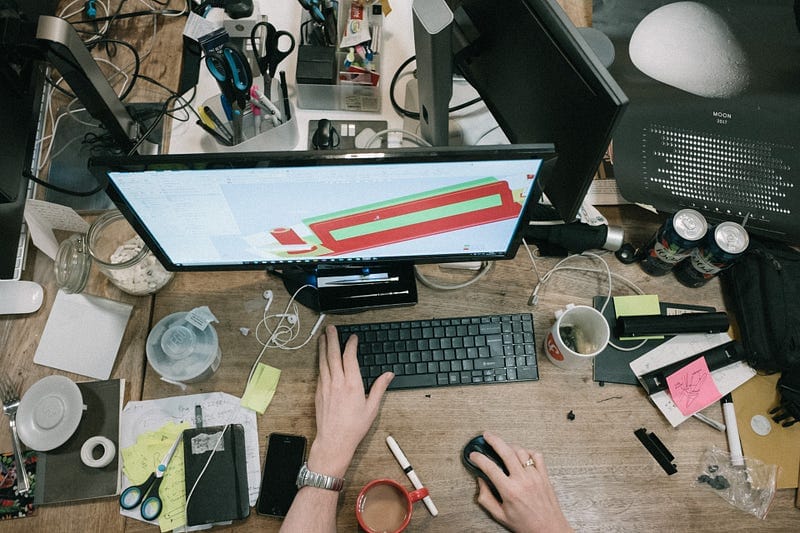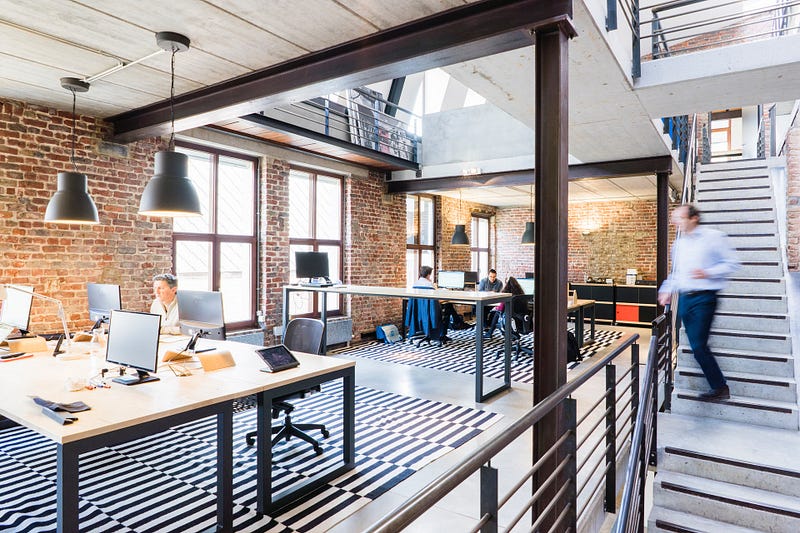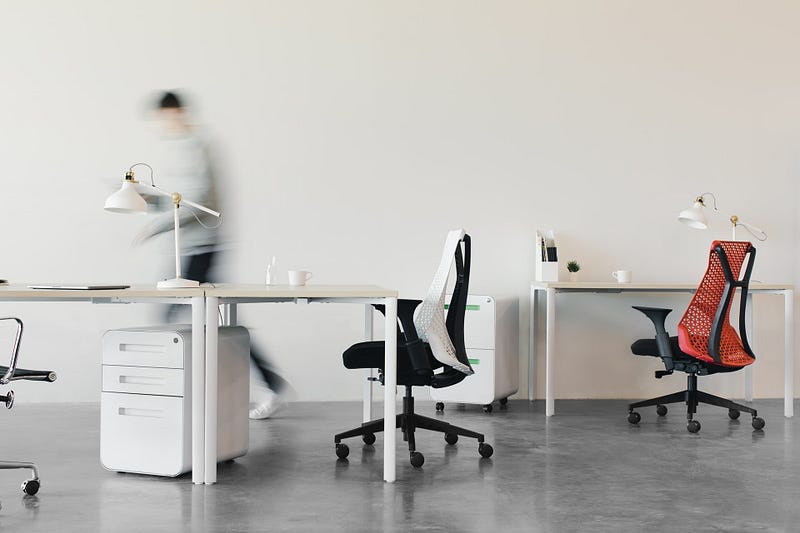I’m One of Those Weirdos Who Actually Wants to Go Back to My Office
But not five days a week, and definitely not for “in-person collaboration”.

My first remote job was a little more than three years ago, and it almost killed me.
I was coming off five years at an agency where I’d only been promoted once (with no pay raise) and had been doing the work of at least two people for actual years, so a new in-house copywriter role for a tech company requiring four remote and one co-working day a week sounded like an absolute dream. I got a new desk at home with a second monitor, Bluetooth keyboard and mouse — the works. Six months later, it took all my mental, emotional, and physical effort just to get out of bed for conference calls at noon or later, let alone do any actual work. Some days I would dial into the calls from my bed, contribute a two-minute status update, and then go back to staring at the wall motionless for hours, hating myself and questioning the need for my own existence.
Part of it was the work itself: writing and rewriting the same ten redundant articles for an AI customer service chatbot company with the same five SEO keywords got old quickly. More intense & insidious was the isolation — this was before video calls really took off during the pandemic as an absolute necessity for remote work. The lack of humanity except for an hour or so of conference calls sandwiched between my own painful procrastination drove me into a full-on depressive episode, my first in years. I’d always considered myself an introvert, but one of my worst traits when I start spiraling is to continually isolate myself, extract myself from the world until maybe it won’t remember I exist and then I’ll magically reappear like nothing happened (spoiler: it doesn’t work like that).
The only bright spot in that wretched eight-month home exile was meeting up with my coworkers every week at a swank local coworking space that was more bar & lounge than anything work-related (it had no actual desks, not enough outlets, and far too many burnished leather tufted settees to get any real work done). And I didn’t even like most of them all that much, either, but it felt good to have a conversation with a real human face instead of a blank screen or a small outdated headshot, out loud instead of on the phone or via silent chat and questionable GIF reactions.
I swore I would never go back to an agency, but eight months into the remote job, that’s just what I did. It was a relief, honestly— a decent Midwest agency with solid Midwest clients. Owned by a London holding company, sure, (who isn’t these days?) but I had an actual desk where I could put tchotchkes and photos and pens, and coworkers I could chat with about horror movies and cats and research and books, whom I also happen to like very much as people. It was a new kind of client for me, a new space in a historic building, dog-friendly, under 30-minute commute, and the first job in almost 15 years where I had the right skillset needed and was able to get to work immediately because I knew exactly what to do.
I had been there almost a year and a half when March 2020 rolled around.

At first, I was secretly relieved. I was feeling burnt out and yet somehow also wanted to be more productive (hi, fellow Millennials), and we already had a remote work policy, so when a chunk of coworkers had to quarantine for two weeks because someone at their clients’ office in St. Louis tested positive for this new virus we’d all heard about, I decided to treat myself to a little self-imposed quarantine. For sanity’s sake.
I didn’t see the inside of that building again for more than six months. And then, it was only for 15 minutes to get my work chair and my second monitor before running back out to my car.
Working from home this time around was slightly better: I already knew my coworkers, and knew how we worked best together. I wasn’t a total new hire to an existing established team this time. Most people kept their video on, too, which helped until I realized I spent most of my video calls staring at the Self-View in Teams (which you STILL cannot turn off like you can in Zoom — please, Microsoft, we all know you can do this, stop acting like you can’t) trying to position my face in a way that most minimizing my double chin and struggling not to loathe every single angle of my big stupid forehead and my creepily big forced-perspective hands.
It was exhausting, and I started spiraling again as the months dragged on, sitting at my kitchen table where we get the most natural light, then moving a couple yards away to the couch when “work time” was “over.” It never was, because my workspace was viewable at all times from most of my home space, and I constantly felt guilty about not working overtime, about not being able to focus despite not having kids or dogs or any other true “distractions” apart from my elderly neighbor’s uncanny ability to fire up her industrial lawnmower at the exact moment I joined a call, not wanting to have video on because I was so sick of watching my own distorted, unmade face for hours at a time, and an adult Inattentive ADHD diagnosis after struggling with what I thought was standard chronic depression and anxiety for literal decades until an accurate diagnosis and correct medication finally lifted the fog a little bit before I was stuck at home all day every day with no end in sight.
Earlier this year we started tentatively poking our heads back into the silent, stuffy office in very limited numbers, and I finally figured it out. I need separation, for my work and my home to be two physically disparate locations so I can fully mentally and emotionally switch from my home self to my work self with enough time for transitions in between.
Without clear delineation, work creeps out of that kitchen and permeates the rest of my life; even when I’m not actually working-working, I’m thinking about working and my imposter syndrome raises the suggestion that I’m not a good employee for not actively working on something at that precise moment, and how I’ll probably get fired because I can’t control my perfectionist procrastination because my motivation is nonexistent and the deadline is in two days and my slide deck is hideous because all the designers are working on more important stuff than my stupid presentation that the client won’t even approve because they’d rather use that budget for creepy AI-powered search ads.
Home needs to be home, for me, and work needs to be work.
Don’t get me wrong, though — I am a big fan of the flexibility WFH provides for everyone who needs it. I like being able to work out in the afternoons without being exhausted as soon as I get back to the house. I like having an extra hour and a half in the mornings to consult my calendar and my to-do list that previously went towards hitting snooze, showering, hair, makeup, outfit, accessories on top of at least 20–30 minutes of drive time to get the actual office.
But I just cannot do all remote work, all the time. And I know I’m in the minority here; most folks I’ve talked to are perfectly fine with remote work for pretty much ever. They have kids who at first were maybe a bit of a nightmare, but now they love the extra time together that’s not eaten up by late hours. They had an extra-long commute that is now no longer an issue, which gives them more time not only for actual work but also for personal time to breathe and maybe even do something for fun every now and then as well. There’s no constant barrage of office donuts and candy jars, so they’ve been cooking healthy food at home and getting plenty of sleep and strength training.
All of these, and pretty much every other reason, are perfectly valid. We all miss seeing each other in person, according to most of our company’s surveys and discussions to date, but very few folks miss the office itself.
And it might be different for me if I had a real office at home — a separate space with a door I could close. But I don’t; my spouse uses my old workspace from my previous WFH, which gets little to no natural light and feels like a cave with no airflow, and also does not have a door that can close, which means we hear each other on calls multiple times a day. And my inattentive ADHD brain can’t help feel fried by the end of the day from so trying so hard to stay focused despite so many endless inputs, his and mine and everything on top and in between, no matter how benign.

So as much as I want to see my colleagues regularly, I get it, and most companies should too, by now. For knowledge work and professional services, there is no real reason to require employees to come to an office five days a week for eight hours a day. Any company who claims they can only be successful that way should have gone out of business by the end of 2020. Because it’s simply not true.
But if companies truly value their employees, there should be options. There should be a dedicated space with a desk for someone who needs it in order to focus and be productive, and there should be flex spaces for folks who want to come in once a week or once a month. There should be privacy areas for individual calls and there should be ways for fully remote, non-local employees to connect and engage with people in a conference room together so no one misses out, whether they’re just working from home that day because their roof is getting fixed or their pet is sick or they’re having a muscle spasm, or because they live five states and two timezones away.
I do not expect agency life or even office life to go back to “normal,” at all — nor do I want it to. Company “culture” is not contingent on butts in chairs 40 hrs a week nor should it be painted on the walls to remind everyone constantly that you have a culture. This corporate fallacy is just one of big reason of many why people are leaving jobs and changing careers in droves, with no signs of stopping. If a business is going to claim to be flexible in order to attract and keep employees, then it’s time to step up and actually be flexible — for people who want to stay home, and for people who need a specific space and time to actually do work, and not just in a blanket statement of You Must Come In At Least Three Days a Week and Always on Mondays and Thursdays, But You Can Choose Your Own Third Day! kind of way.
American Office culture is dead, and I don’t know anyone who’s really mourning it, myself included. At the end of the day, some of us just need a little more space to do the work, and I don’t think that’s asking for too much.
